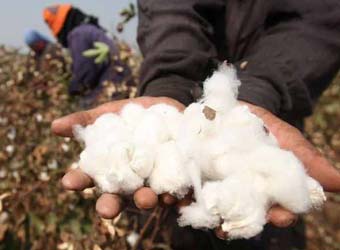Egypt aims to double production of its most famous export, the silky soft cotton once known as “white gold”, after a period of slumping output, an Agriculture Ministry spokesman said on Saturday.
Hamed Abdel-Dayem told Reuters production should rise to 1.4 million qintar (160 kg) within the financial year 2017/2018 that started in July from 700,000 qintar a year earlier. All the cotton will be exported.
The government aims to increase the price of the long staple cotton to more than 3000 Egyptian pounds ($168.07) per qintar, which will all be exported, the spokesman said.
Production of the cotton, used in luxury bedding, has fallen sharply since 2011, a year of political upheaval that coincided with looser regulations that degraded the quality of local cotton.
Egypt’s sunny skies and superior seed help it grow a cotton known for unusually long fibres that produce a light durable fabric with an attractive sheen and soft touch.
Long-staple sells at 155 U.S. cents per lb, about twice the price of common short-staple cotton.
Its return to world markets could provide a lucrative export opportunity at a time when Egypt has a huge trade deficit and is seeking to relaunch its stagnant economy.
In 2016 Egypt banned all but the highest quality cotton seed, dramatically shrinking the area under cultivation but restoring quality, in a bid to save its historic crop.
This year Egypt grew about 220,000 acres (89,000 hectares) of long-staple cotton compared with 130,000 acres (52,600 hectares) during the financial year 2016/2107, Abdel-Dayem said.
Farmers, spinners, and exporters say the weakness of the Egyptian pound following its flotation in November and a scandal over the alleged sale of falsely labelled Egyptian cotton have increased demand for the real thing, injecting life into a historic industry on its deathbed.
Source: Reuters


